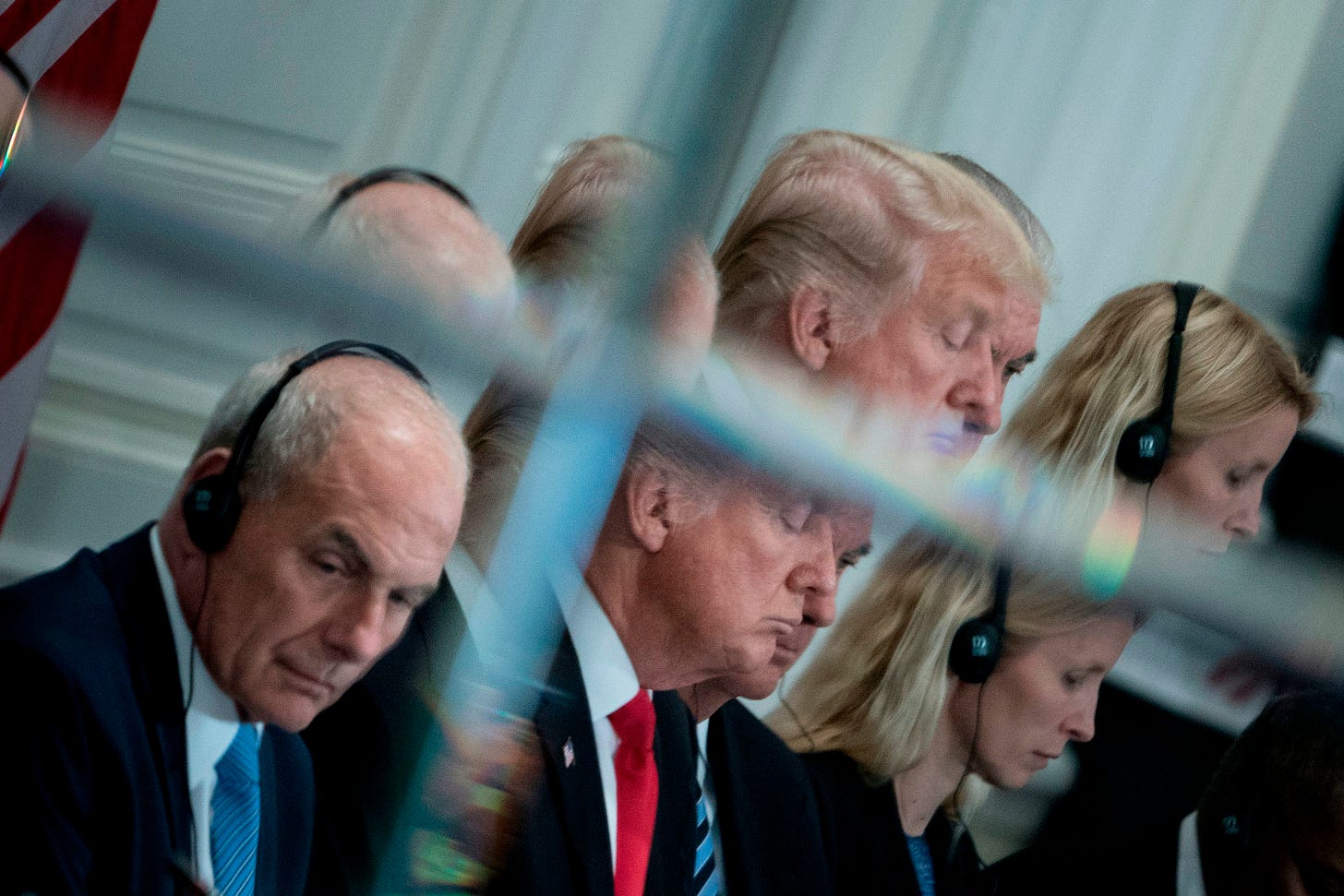Through a Glass Darkly: Donald Trump's “Great Deals” With World Leaders
How mirror imaging is leading the president to misread complex international relationships.

On Wednesday, the White House published a letter, dated October 9th, that President Trump sent to his Turkish counterpart, Recep Tayyip Erdogan. First, he issued a warning to Erdogan that he would “destroy the Turkish economy” if Erdogan went ahead with his genocidal plan. Then, he gave Erdogan a carrot, that if he makes peace with the Syrian Democratic Forces’ leader General Mazlum Abadi, “history will look upon [Erdogan] favorably.” That didn’t deter Erdogan. Instead, the letter ended up in the trash. It’s obvious to virtually all observers of foreign policy that this type of intimidation would not work, but not to the President.
Surveying Donald Trump’s brand of personal diplomacy, one wonders whether the President of the United States is committing the fatal sin of mirror imaging.
Mirror imaging is a cognitive trap that strategists fall into when they mistakenly assume that an adversary will behave the same way they themselves would. It is common—something strategists are wary of and teach inexperienced analysts to avoid. For example, the key mistake made by the United States that led to Pearl Harbor was mirror imaging. The attack surprised American strategists because they would not have made the same decisions had they been in Japan’s position.
This is a trap that Donald Trump is falling into.
Based upon his past actions, Donald Trump has made clear there are a few things that incentivize him: personal recognition and financial gain, chief among them. The notoriety and historical significance of being the first president to walk in the Korean demilitarized zone or being the guy who signs a deal with the Taliban to end the Afghanistan War on an anniversary of 9/11 are cases that attest to his desire for grandiosity at the expense of rational strategy. The consequences of his decisions that will come to fruition after he leaves the office are no matter to him.
It is troubling to imagine then, that he thinks that all leaders function the same way.
Trump’s most frequently (read: only) used foreign policy tool has been America’s economic power. Whether dealing with the Europeans or the Chinese, whether punishing the Iranians or the Turks, Trump’s only resort has been sanctions and tariffs. Issuing a threat to Turkey to deter it from massacring the Syrian Kurds, Trump vowed to destroy Turkey’s economy if Erdogan went ahead with his plan. Similarly, he has responded to Iran’s growing aggressions since the spring only with sanctions.
He also tries personal appeasement. Trump infamously praises dictators regularly, even as he is slamming them with economic pressure. He also praises allied country leaders like Macron, Merkel, and May, again, as he is slamming their economies with tariffs and criticisms on military expenditure.
Donald Trump was a New York real estate developer and TV celebrity. His previous life was almost entirely comprised of materialistic individuals driven by greed and ego. The characters he found himself surrounded by responded to straight-forward personal incentives. World leaders don’t. There are other and often greater factors heads of state take into consideration when they make decisions.
But Trump thinks that they operate the same way he does, or at least are motivated by a similar type of selfishness. This is why he wrongly assumed that the threat of economic sanctions would deter Erdogan from massacring Syrian Kurds. The same logic applies to his thinking that sanctions would deter Iran in the Persian Gulf, something that hasn’t happened. Similarly, he tried to broker deals with China and North Korea with the stick of economic pressure and carrot of personal appeasement.
In the case of Turkey, Erdogan has other concerns. He doesn’t want a Kurdish separatist group on his southern border. Fertility rates for Turks and Kurds in Turkey suggest that Turkey’s population could be majority Kurdish within a generation or two, which is unacceptable to Erdogan’s ethno-nationalist vision. These are factors that have never and would never cross Trump’s mind. This is the result of mirror imaging.
Miscalculations by leaders pose “tremendous” threats to international security. Khrushchev’s miscalculation led to the Cuban missile crisis and almost brought on a nuclear war. Japan’s miscalculation and mirror imaging cost it to absorb two nuclear bombs.
Since the end of World War II, Americans have benefited from reasonably responsible leaders, the quality of our governmental institutions, and our power in most forms. These factors have minimized the costs, number, and magnitude of miscalculations like mirror imaging. As the power gap with our adversaries is narrowing, partially due to their rise and partially due to our self-inflicted wounds, we also must grapple with the fact that we have a leader religiously committed to miscalculations and weakening our institutions.


